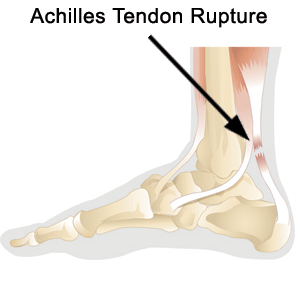The Achilles tendon attaches the calf muscle (called the gastrocnemius and soleus muscles) to the heel. Excessive stress or a tight or fatigued calf muscle can result in microtrauma, degeneration, and even inflammation of the tendon- a condition called Achilles Tendonitis/Tendinosis. Prolonged walking, overtraining (excessive running or jumping, or walking hills can cause this condition.
Recent research suggests that a gradual onset of pain and prolonged recovery might be due to a similar condition called Achilles tendinosis. Tendinosis is chronic degenerative condition and it differs from tendonitis in that there is no inflammation present. It is probably more common than tendinitis because often times tendon pain is not accompanied by the classic inflammatory signs of swelling, redness, and warmth.
Treatment usually consists of rest, non-steroidal anti-inflammatory drugs (NSAIDs), ice, stretching, strengthening and progressive return to function or sport.

Forceful contraction of the calf muscle may rupture (completely tear) the Achilles tendon. It occurs
during jumping, running, and cutting and is often seen in basketball and baseball players.
The patient often reports the sensation of having been hit or violently kicked in the lower calf. There
is pain and a “divot” in the tendon above the heel.
Treatment- non-surgical rehabilitation and surgical repair are viable treatment options. Active people
may experience more benefit from surgical repair. Rehabilitation may require six to twelve months of
progressive care.


Follow Us
Medical Library
Loading...Please Wait
Select an Article:
Achilles Tendonitis and Rupture
The Achilles tendon attaches the calf muscle (called the gastrocnemius and soleus muscles) to the heel. Excessive stress or a tight or fatigued calf muscle can result in microtrauma, degeneration, and even inflammation of the tendon- a condition called Achilles Tendonitis/Tendinosis. Prolonged walking, overtraining (excessive running or jumping, or walking hills can cause this condition.
Recent research suggests that a gradual onset of pain and prolonged recovery might be due to a similar condition called Achilles tendinosis. Tendinosis is chronic degenerative condition and it differs from tendonitis in that there is no inflammation present. It is probably more common than tendinitis because often times tendon pain is not accompanied by the classic inflammatory signs of swelling, redness, and warmth.
Treatment usually consists of rest, non-steroidal anti-inflammatory drugs (NSAIDs), ice, stretching, strengthening and progressive return to function or sport.
Forceful contraction of the calf muscle may rupture (completely tear) the Achilles tendon. It occurs during jumping, running, and cutting and is often seen in basketball and baseball players. The patient often reports the sensation of having been hit or violently kicked in the lower calf. There is pain and a “divot” in the tendon above the heel.
Treatment- non-surgical rehabilitation and surgical repair are viable treatment options. Active people may experience more benefit from surgical repair. Rehabilitation may require six to twelve months of progressive care.
Possible Treatments
Possible Treatment Goals
Additional Resources
Top of Article
List of Articles
Disclaimer
The information in this medical library is intended for informational and educational purposes only and in no way should be taken to be the provision or practice of physical therapy, medical, or professional healthcare advice or services. The information should not be considered complete or exhaustive and should not be used for diagnostic or treatment purposes without first consulting with your physical therapist, occupational therapist, physician or other healthcare provider. The owners of this website accept no responsibility for the misuse of information contained within this website.
Copyright 2025, Montclair Physical Therapy Inc. All Rights Reserved. Powered by E-Rehab.
Montclair Physical Therapy • 6116 Medau Pl • Oakland, CA 94611 • (510) 679-1448
Montclair Physical Therapy • 473 34th St • Oakland, CA 94609 • (510) 339-2116 • http://www.montclairpt.com/